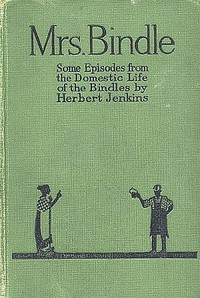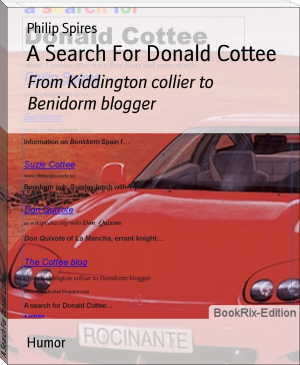Adventures of Bindle by Herbert George Jenkins (shoe dog free ebook txt) 📗

- Author: Herbert George Jenkins
Book online «Adventures of Bindle by Herbert George Jenkins (shoe dog free ebook txt) 📗». Author Herbert George Jenkins
"I said Mr. Hearty," retorted Mrs. Bindle angrily.
"Oh! 'Earty," said Bindle contemptuously. "'Earty'd open anythink except 'is 'eart, or a barrel of apples 'e's sellin', knowin' them to be rotten. Wot's 'e want to open another shop for? 'E's got two already, ain't 'e?"
"Why haven't you got on?" stormed Mrs. Bindle inconsequently. "Why haven't you got three shops?"
"Well!" continued Bindle, "I might 'ave done so, but wot should I sell in 'em?"
"You never got on, you lorst every job you ever got. You'd 'ave lorst me long ago if——"
"No," remarked Bindle with solemn conviction as he rose and took his cap from behind the door. "You ain't the sort o' woman wot's lorst, Mrs. B., you're one o' them wot's found, like the little lamb that Ole Woe-and-Whiskers talked about when I went to chapel with you that night. S'long."
The news about Mr. Hearty's third venture in the greengrocery trade occupied Bindle's mind to the exclusion of all else as he walked in the direction of Chelsea to call upon Dr. Richard Little, whom he had met in connection with the Temperance Fête fiasco at Barton Bridge. He winked at only three girls and passed two remarks to carmen, and one to a bus-conductor, who was holding on rather unnecessarily to the arm of a pretty girl.[Pg 44]
He found Dick Little at home and with him his brother Tom, and "Guggers," now a captain in the Gordons.
"Hullo! Here's J.B., gug-gug-good," cried Guggers, hurling his fourteen stone towards the diminutive visitor.
"Blessed if it ain't ole Spit-and-Speak in petticoats," cried Bindle. "I'm glad to see you, sir, that I am," and he shook Guggers warmly by the hand.
Guggers, as he was known at Oxford on account of his inability to pronounce a "G" without a preliminary "gug-gug," had taken a prominent part in the Oxford rag, when Bindle posed as the millionaire uncle of an unpopular undergraduate.
Bindle had christened him Spit-and-Speak owing to Gugger's habit of salivating his words.
When the men were seated, and Bindle was puffing furiously at a big cigar, he explained the cause of his visit.
"I ain't 'appy, sir," he said to Dick Little, "and although the 'ymn says ''ere we suffer grief an' woe,' it don't say we got to suffer grief an' woe an' 'Earty, altogether."
"What's up, J.B.?" enquired Dick Little.
"Well, if the truth's got to be told, sir, I got 'Earty in the throat."
"Got what?" enquired Tom Little, grinning.
"'Earty, my brother-in-law, 'Earty. I 'ad 'im thrust down my throat to-night with stewed-steak-and-onions an' apple-puddin'. The stewed-steak and the puddin' slipped down all right; but 'Earty stuck."
"What's he been up to now?" enquired Dick Little.
"'E's goin' to open another shop in Putney 'Igh Street, that's number three. 'Earty with two shops give me 'ell; but with three shops it'll be 'ell and blazes."
"Gug-gug-gave you hell?" interrogated Guggers.
"Mrs. B.," explained Bindle laconically. Then after a pause he added, "No matter wot's wrong at 'ome, if the pipes burst through frost, or the butcher's late with the meat, or if it's a sixpenny milkman instead of a fivepenny milkman, Mrs. B. always seems to think it's through me not being like 'Earty, as if any man 'ud be like 'Earty wot could be like somethink else, even if it was a conchie. No," continued Bindle, "somethink's got to be done. That's why I come round this evenin'."
"Can't we gug-gug-get up a rag?" enquired Guggers. "If I gug-gug-go back to France without a rag we shall never beat the Huns."
For a few minutes the four men continued to smoke, Dick[Pg 45] Little meditatively, Bindle furiously. It was Bindle who broke the silence.
"You may think I got a down on 'Earty, sir?" he said, addressing Dick Little. "Well, p'rap's I 'ave: but 'Eaven's sometimes a little late in punishin' people, an' I ain't above lendin' an 'and. 'Earty's afraid o' me because 'e's afraid of wot I may say, knowin' wot I know."
With this enigmatical utterance, Bindle buried his face in the tankard that was always kept for him at Dick Little's flat.
"We might of course celebrate the occasion," murmured Dick Little meditatively.
"Gug-gug-great Scott!" cried Guggers. "We will! Gug-gug-good old Dick!" He brought a heavy hand down on Dick Little's shoulder blade. "Out with it!"
For the next hour the four men conferred together, and by the time Bindle found it necessary to return to his "little grey 'ome in the west," the success of Mr. Hearty's third shop was assured, that is its advertisement was assured.
"It'll cost an 'ell of a lot of money," said Bindle doubtfully as he rose to go.
"Gug-gug-get out!" cried Guggers, whose income was an affair of five figures. "For a rag like that I'd gug-gug-give my—my——"
"Not your trousers, sir," interrupted Bindle, gazing down at Guggers' brawny knees; "remember you gone into short clothes. Wouldn't do for me to go about like that," he added, "me with my various veins."
And Bindle left Dick Little's flat, rich in the knowledge he possessed of coming events.
II"Any'ow," remarked Bindle as he stood in front of the looking-glass over the kitchen mantelpiece, adjusting his special constable's cap at a suitable angle. "Any'ow, 'Earty's got a fine day."
Mrs. Bindle sniffed and banged a vegetable-dish on the dresser. She appeared to possess an almost uncanny judgment as to how much banging a utensil would stand without breaking.
"Now," continued Bindle philosophically, "it's a fine day, the sun's shinin', people comin' out, wantin' to buy vegetables; yet I'll bet my whistle to 'is whole stock that 'Earty ain't 'appy."
"We're not here to be happy," snapped Mrs. Bindle.
"It ain't always easy to see why some of us is 'ere at all,"[Pg 46] remarked Bindle, as he gave his cap a further twist over to the right in an endeavour to get a real Sir David Beatty touch to his appearance.
"We're here to do the Lord's work," said Mrs. Bindle sententiously
"But d'you mean to tell me that Gawd made 'Earty specially to sell vegetables, 'im with a face like that?" questioned Bindle.
Mrs. Bindle's reply was in bangs. Sometimes Bindle's literalness was disconcerting.
"Did Gawd make me to move furniture?" he persisted. "No, Mrs. B.," he continued. "It's more than likely that Gawd jest puts us down 'ere an' lets us sort ourselves out, 'Im up there a-watchin' to see 'ow we does it."
"You're a child of Moloch, Joseph Bindle," said Mrs. Bindle.
"A child o' what-lock?" enquired Bindle "Who's 'e?"
"Oh! go along with you, don't bother me. I'm busy," cried Mrs. Bindle. "I promised Mr. Hearty I'd be round at two o'clock."
"Now ain't that jest like a woman," complained Bindle to a fly-catcher hanging from the gas-bracket. "Ain't that jest like a woman. If you're too busy to tell me why I'm a child of ole What-a-Clock, why ain't you too busy to tell me that I am a child of ole What-a-Clock?" and with this profound enquiry Bindle slipped out, assuring Mrs. Bindle that he would see her some time during the afternoon as he was to be on duty in Putney High Street, "to see that no one don't pinch 'Earty's veges."
Ten minutes later Bindle stood in front of Mr. Hearty's new shop, aided in his scrutiny by two women and three boys.
"There ain't no denying the fact," murmured Bindle to himself, "that 'Earty do do the thing in style. If only 'is 'eart wasn't wot it is, an' if 'is face was wot it might be, 'e'd make a damn fine brother-in-law."
At that moment Mr. Hearty appeared at the door of the shop, bowing out a lady-customer, obviously someone of importance to judge by the obsequious manner in which he rubbed his hands and bent his head.
"Cheer-o! 'Earty!" cried Bindle.
Mr. Hearty started and looked round. The three errand boys and the two women looked round also and fixed their gaze on Bindle. Mr. Hearty devoted himself more assiduously to his customer, pretending not to have heard.
"I'll run in about six, 'Earty, and 'ave a look round," continued Bindle. "I'm on dooty till then. I'll see they don't pinch your stock," and he walked slowly down the High Street[Pg 47] in the direction of the bridge, followed by the grins and gazes of the errand boys.
Mr. Hearty's new shop was, without doubt, the best of the three. A study in green paint and brass-work, it was capable of holding its own with the best shops in the West End. In the window was a magnificent array of fruits. Outside were the vegetables. Everything was ticketed in plain figures, figures that were the envy and despair of other Putney greengrocers.
It was Mr. Hearty's hour.
As Bindle promenaded the High Street, his manner was one of expectancy. Twice he looked at his watch and, when walking in the direction of Putney Hill, he would turn and cast backward glances along the High Street. During his second perambulation he encountered Mrs. Bindle hurrying in the direction of Mr. Hearty's new shop. He accorded her a salute that would have warmed the heart of a Chief Commissioner of the Police.
Meanwhile Mr. Hearty was gazing lovingly at the curved double brass-rail that adorned his window, looking like a harvest festival decoration. Mr. Hearty believed in appearances. He would buy persimmons, li-chis, bread-fruit, and custard-apples, not because he thought he could sell them; but because they gave tone to his shop. Those who had not heard of persimmons and li-chis were impressed because Mr. Hearty was telling them something they did not know; those who had heard of, possibly eaten, them were equally impressed, because he was reminding them of Regent Street and Piccadilly. As Bindle phrased it, Mr. Hearty was "a damn good greengrocer."
Mr. Hearty was interrupted in his contemplation of the fruity splendour of his genius by the entry of a customer, at least something had come between him and the light of the sun.
He turned, started violently and stared. Then he blinked his eyes and stared again. A man had entered wearing a silk-faced frock-coat of dubious fit and doubtful age, a turn-down collar, a white tie and trousers that concertinaed over large ill-shaped boots. On his head was a black felt hat, semi-clerical in type, insured against any sudden vagary of the wind by a hat-guard.
Mr. Hearty gazed at the man, his eyes dilated in astonishment. He stared at the stranger's sunken, sallow cheeks, at his heavy moustache, at his mutton-chop whiskers. The man was his double: features, expression, clothes; all were the same.
"'Ullo! 'Earty! Put me down for a cokernut an' an onion."
Bindle, who had entered at that moment, dug the stranger in the ribs from behind. He turned round upon his assailant, then[Pg 48] Bindle saw Mr. Hearty standing in the shadow. He looked from him to the stranger and back again with grave intentness. Both men regarded Bindle.
"Good afternoon, Joseph," said Mr. Hearty at length in his toneless voice, that always seemed to come from somewhere in the woolly distance.
"Good afternoon, Joseph," said the stranger in a voice that was a very clever imitation of that of Mr. Hearty.
Bindle fumbled in the breast-pocket of his tunic and produced a box of matches. Going up to Mr. Hearty he struck a match. Mr. Hearty started back as if doubtful of his intentions. Bindle proceeded to examine Mr. Hearty's features by the flickering light of the match, then turning to the stranger, he went through the same performance with him. Finally pushing his cap back he scratched his head in perplexity.
"Well, I'm damned!" he ejaculated. "Two 'Earty's."
"I want a cauliflower, please." It was the stranger who spoke.
Bindle once more proceeded to regard the stranger critically.
"I s'pose you're what they call an alibi," he remarked.
The stranger had no time to reply, as at that moment another man entered. In garb and appearance he was a replica of the first. Mr. Hearty looked as a man might who, without previous experience of alcohol, has just drunk a whole bottle of whisky.
Bindle whistled, grinned, then he smacked his leg vigorously.
"My cauliflower, please," said the first man.
"Good afternoon, Joseph," said the new arrival. The voice was not so good an imitation.
At that moment Smith, Mr. Hearty's right-hand man, thrust his head through the flap in the floor of the shop that gave access to the potato-cellar. He caught sight of the trinity of masters. He gave one frightened glance, ducked his head, and let the flap down with a bang just as a third "Mr. Hearty" entered. He was followed almost immediately by a fourth and fifth. Each greeted Bindle with a "Good-afternoon, Joseph."
Just as the sixth Mr. Hearty entered, Smith pushed up the flap again, this time a few inches only, and with dilated eyes looked out. The sight of seven "masters," as he afterwards confessed to Billy Nips, the errand boy, "shook 'im up crool." Keeping his eyes fixed warily upon the group of





Comments (0)